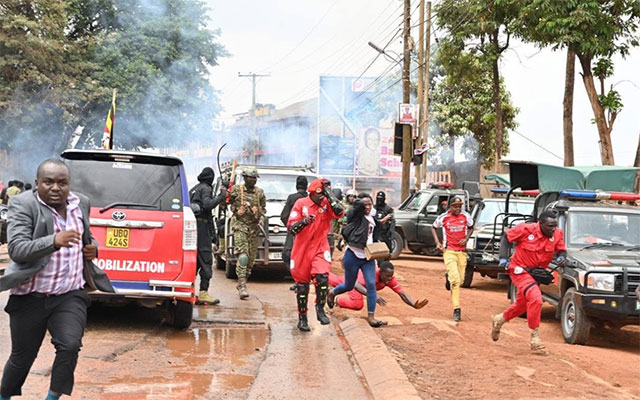
Digital authoritarianism: The case for Facebook in Uganda
Uganda’s actions towards startups and innovators are a total contradiction of its well-documented, yet wishful vision.
On the eve of the 2021 January 14th general election in Uganda, the battle for number associated with different political aspirants shifted largely to digital platforms, thanks to Covid-19, the global pandemic that made it an existential threat for the usual campaign rallies.
It is nearly five years now and another general election is in the corner, but the causalities of the 2021 digital election campaign in Uganda are still bemoaned. It was widely asserted that the presidential election that extended President Museveni’s stay in power, was shambolic and lacked the basic tenets of a free and fair election.
Uganda accused Facebook of being biased after the social media giant deleted suspected pro-government social media accounts for undermining its “policies and manipulation of public debate”. The now more than 4-year-long ban came two-days to the 2021, January 14th presidential polls. Facebook’s move to block pro-government accounts suspected of spreading harmful propaganda was sheer “arrogance” according to incumbent President Gen. Yoweri Museveni, who has ruled Uganda since late January 1986.
Critics believe this was to silence critical voices about an election campaign that was already spilling blood. “The mainstream media is highly restricted by the regime, so social media would be the best tool to use”, David Lewis Rubongoya; the main opposition National Unity Platform Secretary General noted. To date, a section of the online dwellers defiantly uses hidden IP addresses via Virtual Private Network (VPNs) to access the once most used social media platform in Uganda, something Rubongoya believes has “most definitely” affected their reach.
The ban has also facilitated losses to service-based businesses and social interactivity. Ronald Hakiza, is the country director-Treepz; an online public transport agency in Uganda. He told Ukweli Africa that his company had over 60% of its revenue coming from Facebook “ads and sales” and its suspension was “a huge setback”. He adds that their customer acquisition cost was about Uganda shillings 2000 (less than a dollar) before the ban, but it now goes for about 7000 Uganda shillings (about two dollars) per customer. Considering that Facebook is the most popular in Uganda, its restriction has also affected “prominent” digital companies like Jumiya, according to lawyer Patrick Katabaazi. Young people who have always been relying on Facebook “for marketing ideas” were unfairly penalised, because digital marketing is a question of “social media interaction and traffic engagement” which the ban just messed up with especially the critical factor of audience reach.
Negotiations with Facebook
A year after Facebook, now Meta was banned in Uganda, the government of Uganda started negotiations with Facebook to find modalities on how the ban can be lifted. Chris Baryomunsi, the government spokesperson and Minister of Information, ICT and National Guidance in Uganda exclusively told this reporter that, Facebook was closed for “genuine reasons” but he could not cite particulars provisions of the law flouted by the Meta company. “…government reserves the right to reprimand”, he stressed. To date, no progress has been reported about the said negotiations.

Museveni’s main challenger: popstar now politician Bobi Wine (Robert Kyagulanyi) accused the ruling establishment of hiring influencers engaged in coordinated attacks against him while praising what he calls an “inept” regime. Wine believes Museveni faced with so much pressure and he could only run an election on falsehoods. “…hired a big group of people to run multiple social media accounts to promote his regime of blood and shame!” Wine tweeted.

Uganda’s vision 2040
In 2007, Uganda’s cabinet approved the country’s vision 2040; a strategic path to “a transformed Ugandan society from a peasant to a modern and prosperous county with in 30 years” ICT and Infrastructure development, through the implementation of the country’s National science technology and engineering systems is a core target to the vision. But to reviewers, Uganda’s actions towards startups and innovators is a total contradiction of her well documented vision. Louis Namwanja Kizito, a lawyer with an ardent interest in hi-tech believes the Facebook Metaverse will leave Uganda in her position as a “net internet consumer”, citing the “unreadiness” for the digital revolution.
It can be observed that whereas Uganda’s State House and the official President Yoweri Museveni’s Facebook pages were last used on January 11th, 2021, other state institutions like the army communications directorate, Uganda Police Force, the Parliament of Uganda and individual officials continue to use the Facebook in total disregard of its ban.
Enter twitter/X and Tik-Tok
The game-changer is now tik-tok. In early 2021 when Facebook was put on operation halt in Uganda, twitter then, now X became the run to platform for political communication and activism. Both state and nonstate actors embraced the then blue-bird and became the Centre of attraction. Activists, brutally chased out streets and main stream media platforms used twitter to advance their particular causes. Important to note was the digital way of exposing weaknesses of the state, in what was called the “exhibition”. From exposing the sorry state of roads in Kampala, in what was called the #KampalaPotHoleExhibition, to the crumbling health sector and corruption twitter (X) suitably filled the space, Facebook had left.
The online exhibitions utilized satire and humor to bring attention to the country’s infrastructure issues, corruption and other often hidden injustices in Uganda’s political, social and economic affairs. These are campaigns that demonstrated how social media can be leveraged to expand civic space and promote accountability among leaders.
Misuse and vulnerability
In 2024 alone, social media user widely known as tik-tokers were largely exposed to the repressive nature of the state, after, “exceeding the limitations of their freedom of expression”. The state Minister of ICT, Joyce Nabbosa Ssebugwawo, reportedly told, Daily Monitor’s Paul Adude, that “tik-tokers should start behaving”, the minister noted that, they (the government) were tired of the way they (tik-tokers) were behaving [1].
Twitter/X and TikTok have become significant platforms for political discourse in Uganda, from 2021. On TikTok, for instance, a user called Ibrahim Musana, also known as Pressure 24 Seven, was arrested and charged for disseminating information that mocked President Yoweri Museveni and the Kabaka (King) of Buganda, Ronald Muwenda Mutebi.
While Musana is battling computer misuse charges, a one Edward Awebwe, in July 2024, became the first tik-toker to be sentenced to serve a six-year -jail term, creating a precedent that is likely to open prison doors for many content creators, who a section of them asserts have taken “things for granted, and disregarding the consequences of what they say in their videos” and how they affect other people.
It is in no doubt that the digital posture of the state in Uganda, highlights its increasing scrutiny of online activities, particularly those deemed critical of the authorities. Social media platforms have become crucial spaces for Ugandans to express their opinions, mobilize support, and engage in political discussions.
Author: Kayonga Paul
Date:1st February, 202
[1] https://www.monitor.co.ug/uganda/news/national/tiktokers-new-enemies-of-state–4850910#story
